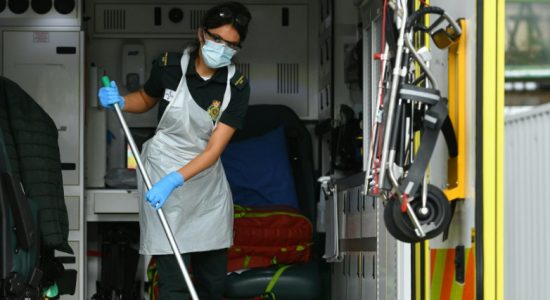Rapid Innovation in the health sector during the COVID-19 pandemic
On the 23rd March 2020 in an unprecedented step to attempt to limit the spread of COVID-19 the United Kingdom went into lockdown. We were asked to ‘stay at home to protect the NHS’ amid the growing incidence of the virus. Our NHS were facing the growing threat of the outbreak and immense pressure on an already pressurised service. Within Wales 19 field hospitals were built and established to help deal with the potential numbers of infected patients that required hospitalisation.
The Ambulance Service within Wales also came under sustained additional pressures during the pandemic with the number of COVID-19 related calls often exceeding 1,000 per day in the month of March and April.

The Challenge
During the pandemic the Welsh Ambulance Service (WAST) explained that ambulances must be thoroughly cleaned once a patient with suspected COVID-19 had been transported. These cleaning times could take up to 45 minutes to 2 hours and, in some circumstances, had to be undertaken at specialist cleaning centres which can be some distance away from the ambulances station or hospital site.
This put an increased strain on an already busy and pressurised service as the vehicles could not be used until the cleaning was completed.
The challenge looked to identify, develop and demonstrate rapid sanitising technologies to help the WAST teams in their fight during the pandemic.

The Process
SBRI is a government funded scheme which enables the public sector to approach business with a problem and enables them to tap into new ideas and technologies from businesses and to help speed up their adoption.
Due to the rapid and evolving nature of the COVID-19 Pandemic the SBRI Centre along with colleagues within Welsh Government decided to undertake a ‘rapid’ SBRI. This approach was the first of its kind within the UK to enable any technologies to be accessed quickly. This project managed to accelerate the SBRI process from a 12-18 month process into 6 weeks.
The People
This project was an integrated collaboration throughout with WAST, SBRI Centre and the Welsh Government. In addition building upon skills from across other UK departments including the Defence and Security Accelerator and the Defence and Security Technology Laboratories.
There was a real passion from all involved to make a real difference during such difficult and challenging times, keeping it real, whilst addressing a live issue as it was happening during the peak of the pandemic.
The call to Industry
The call to industry was released on the 25th March 2020 with 1 week for applicants to apply. There was an overwhelming interest with 216 applications for such a short window, with interest from industry and academia. What was apparent when evaluating the proposals was industries passion to help us in the fight against COVID 19, with some applicants offering to undertake the project free of charge.
Of these 216 applications 12 were chosen to test the effectiveness of their solutions with the Defence and Security Technology Laboratories. This process was undertaken within a week with 3 solutions then going on to test on a Welsh Ambulance.
The Results
One of the solutions was presented by Swansea University and their Research and Development is still continuing.
WAST went on to work with 2 of the suppliers doing some development work with 1 of them and a demonstration for staff with the other supplier. WAST are currently in the process of writing a business case in the hope for procurement of these solutions.
The Defence and Security Technology Laboratories completed their Technical Report which included findings from testing the 12 solutions. Although this report is confidential it has been allowed to circulate within Public Bodies on request.
The Benefits
There were many benefits to running this challenge and how the use of technology and innovation can help to improve working practices.
The main areas where the successful solutions made an impact were:
• Reducing the time it takes to clean an ambulance by 86%.
• Giving the staff the time to undertake other duties whilst the cleaning process is underway.
• Reducing the cost of cleaning an ambulance by 82%.
• Ability to be able to produce a ‘gold standard’ of cleaning.
The Learning
All the stakeholders involved in this project have a real bias for ‘learning and discovery’ that will spread the learning from this project wider than just the ambulance setting.
Projects are underway in other areas of Welsh Government on the back of this looking at how the learning can be used in other environments e.g. Schools.
During this project WAST have allowed themselves to analyse their processes and discovered new ways to measure performance, infection prevention and control.
This has given them the confidence to consider and implement new processes. The SBRI team learned that they are adaptable and were quickly able to step up to assist the ambulance service during a crisis. They moulded the SBRI process to assist the service and show the benefits of innovation even in difficult and challenging times.
The Future
So would we do another rapid SBRI? The answer is yes, although the conditions would need to be right and there isn’t always a solution that has been developed. Rapid delivery needs projects to be near to market or used in other industry environments to be adapted for the purpose of the SBRI.
Innovations can take time to deliver and people often within the public sector need their challenges resolving with some urgency, especially during a pandemic. Challenge Leads from the Public Sector would need to show a real commitment and enthusiasm for change, the Welsh Ambulance Service was a perfect example of this.
Longer term SBRI’s allow the Challenge Leads to really work with industry and academic partners to build and develop something that really meets their needs. It gives all parties the benefits of collaborating, using each other’s unique skills and areas of expertise to use innovate to make a difference.
If you wish to discuss further or learn more about running your own SBRI please contact the SBRI Team on [email protected].
